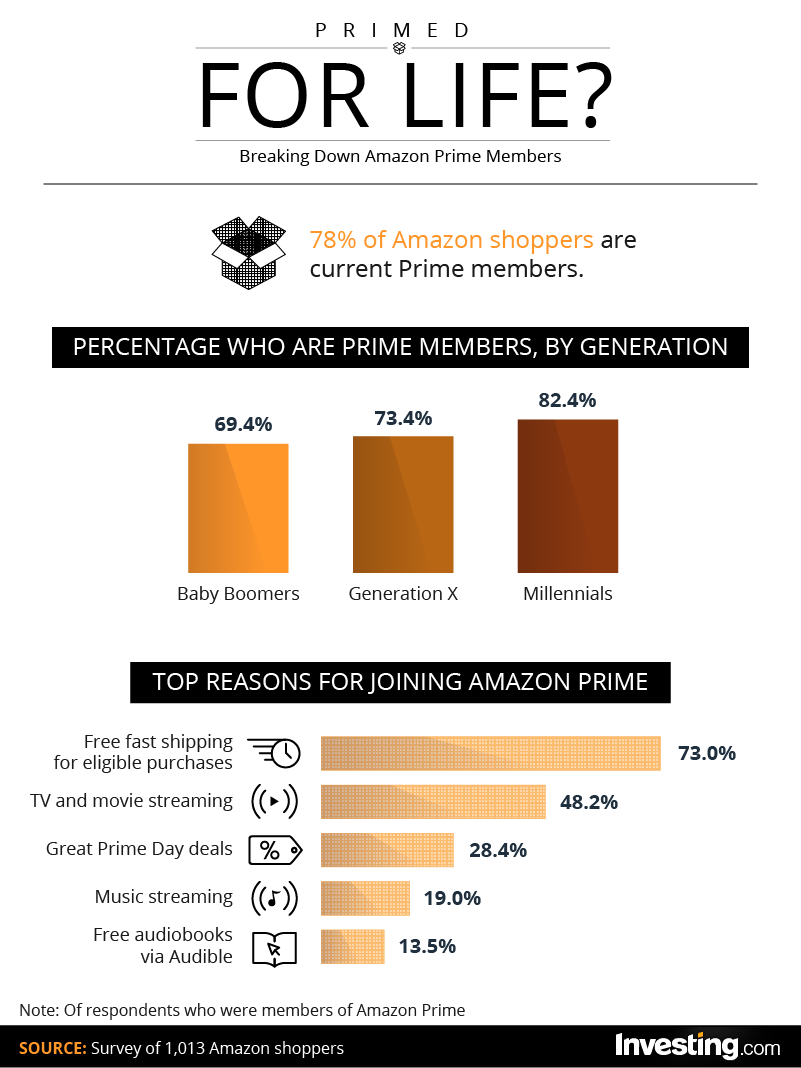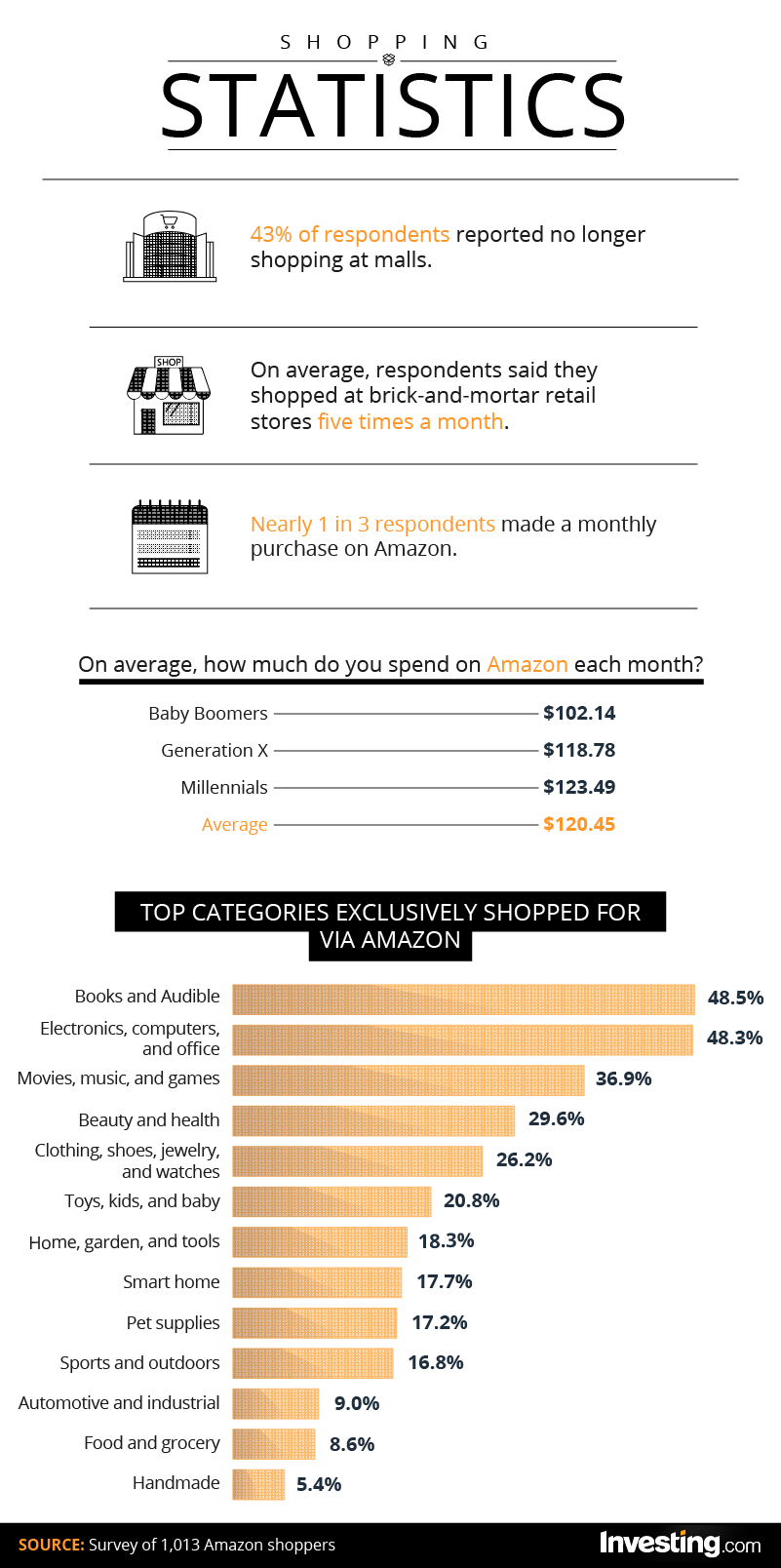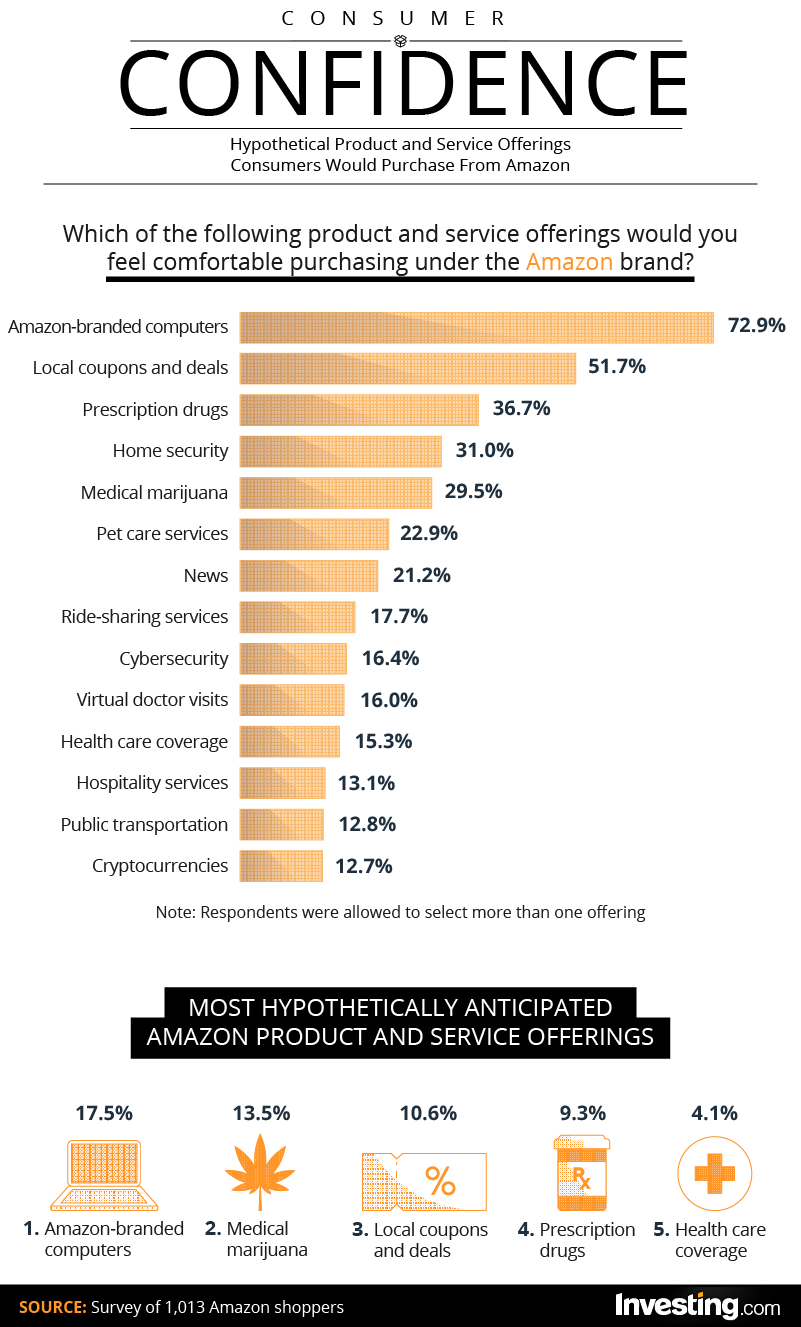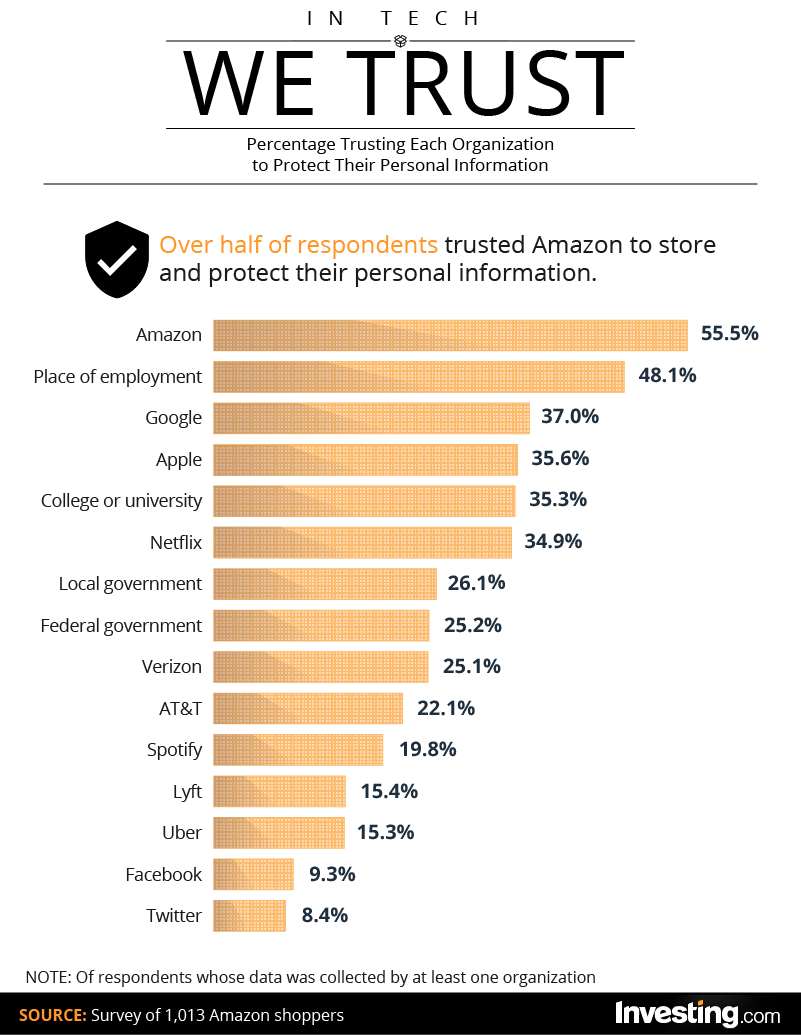
- All Instrument Types
- Indices
- Equities
- ETFs
- Funds
- Commodities
- Currencies
- Crypto
- Bonds
- Certificates
Please try another search

A Look at Amazon - Market Monopoly or Cult of Convenience?
Where is the first place you look when you need to buy a new charger for your phone? A cast iron skillet? A robot vacuum? For nearly a third of Americans, the first answer is Amazon.
With 90 million U.S.-based Amazon Prime members, the average subscriber spends roughly $1,300 every year on the e-commerce site (compared to $700 spent by nonsubscribers).
For $119 a year, you can have everything from daily household goods to shoulder bags shaped like a corgi butt shipped to your front door in just two days (or even within a few hours in some areas).
The convenience of online shopping combined with a wide assortment of products have helped make Amazon one of the most valuable companies in the world.

Having established a loyal customer base around the world, Amazon has even begun branching out into new services. An employee of the tech titan can help you install smart appliances in your home, and you soon may even be able to purchase health care through Amazon’s internet offerings.
The company’s explosive growth in recent years has gotten us quite curious, so we surveyed over 1,000 Amazon shoppers to find out how often they’re ordering from the site, how much they trust the company, and which items they are (and aren’t) comfortable buying through on Amazon.
Read on as we delve into the question of whether Amazon is cult of convenience or just a market monopoly.
Are Amazon’s Customers Loyal?
One of the core reasons Amazon is so successful in retaining its customer basis is the Prime subscription, which gets you free 2-day shipping, reduced fees on faster shipping options, Prime Video streaming, access to exclusive brands and products, and even unlimited photo storage on Amazon’s cloud service. Whether Amazon shoppers are interested in those extra features, a majority still elected to enroll in the program.
In fact, 78% of Amazon’s consumers fork over the cash just to stay enrolled in Prime each year.

The main reason customers subscribed to Prime was free, fast shipping on eligible purchases, particularly amongst millennials (82%), followed by Gen Xers (73%) and baby boomers (69%). Prime’s other offerings were less popular among those surveyed. Subscribers said that TV and movie streaming (48%) and Prime Day deals (28%) were also top reasons for their decision to pay for the service.
From a customer retention perspective, the benefits of a Prime membership may increase loyalty among shoppers. More than 80% of users stayed enrolled in the service for at least a year, and over a third were Prime members for four years or longer.

How Amazon Changed Consumption
Whether you’ve explored the wild and wacky side of Amazon’s online product catalog, there’s no denying that shopping on the site and having products delivered to your doorstep is wonderfully convenient. Across the Amazon customers surveyed, 43% stopped shopping at the mall, and nearly 1 in 3 shoppers said they ordered something via Amazon once a month.
With average monthly spending of just over $120, some users even shopped for certain categories of products exclusively through Amazon. Nearly 49% of survey respondents looked for books and audiobooks exclusively through the retail site, and 48% did the same for their electronic purchases. As a result of its extremely competitive pricing and relationship with smaller, independent publishers, some analysts have gone so far as to say Amazon has created a monopoly in the book industry.
Shoppers were also less inclined to look elsewhere for movies, music, and games (37%); beauty and health purchases (30%); and clothing, shoes, and jewelry (26%).

Amazon - A Trustworthy Retailer?
If Amazon Key is any indication, shoppers don’t just like what Amazon has to offer — they deeply trust the brand and its offerings. The newly launched in-home delivery service allows employees with packages to enter a customer’s home, drop off their order, and leave while the house is potentially unattended. That level of confidence is hard-won and highly prized in the retail industry at large.
Still, not all hypothetical product categories were as popular with Amazon shoppers.
Compared to a new Amazon-branded computer (73%) or local coupons and deals (52%), which a majority of shoppers were comfortable buying from the Amazon brand, other offerings including health care coverage (15%), public transportation (13%), and cryptocurrencies (13%) could make shoppers more hesitant. While many were less confident about buying medical marijuana (13.5%) or prescription drugs (9.3%) through Amazon, respondents anticipated Amazon would eventually provide those services.

Changing the Game (to Monopoly?)
There’s no denying Amazon has a disruptive effect in nearly every industry it experiments with. When Amazon bought Whole Foods in 2017, the market share for the grocery store’s major competitors plummeted, forcing the store to lower its prices in a number of categories to remain competitive. Starting its own delivery and logistics service may save Amazon over $1 billion annually, but it will likely have a major negative impact on other carriers (including FedEx and UPS).
Most shoppers don’t believe Amazon has reached its peak, either. 88% of those surveyed believed Amazon would continue to grow, branching off into even more industries. One in 4 shoppers anticipated Amazon would disrupt the delivery service industry next, followed by pharmaceuticals (19%), artificial intelligence (13%), and health care (9%).

Trust - Amazon’s Strong Suit
While most internet users are using “the cloud” in some capacity to stream TV shows or music, not everyone feels as comfortable putting their personal data on a network they don’t control. Cloud-based storage solutions are typically more secure than most people expect, many worry about being exposed by certain platforms without their consent.
Of all the organizations and cloud-based providers included in our survey, Amazon shoppers most trusted Amazon’s services to protect their personal information. Over 55% of respondents said they had high trust in Amazon — an even higher percentage than their place of employment (48%), Google (37%), Apple (36%), and their college or university (35%). The federal government (25%) and Facebook (9%) scored much lower in consumer confidence when personal information was at risk.
Amazon’s Cult of Convenience
Amazon isn’t just any online retailer. It has an established consumer base of millions of people who enjoy its products and services enough to remain loyal subscribers to Amazon Prime, often for years.
This loyalty is, in part, a direct result of Jeff Bezos’ focus on customer-focused innovation. Bezos’ empty chair approach is a good example; whenever Amazon’s CEO holds meetings, one chair in the room is left empty, meant to represent the consumer. The goal is to remind attendees to take the consumers into account and not just focus on the organization.
As we went through the answers, we got the overwhelming sense that millions of Amazon shoppers will stay with the company through thick and thin. To them, Amazon isn’t just any online retailer - they truly trust the brand.
Some of the people polled eagerly awaited a time when Amazon might potentially offer health care services, pharmaceutical offerings, and medical marijuana – when the time is right.
We’ve come full-circle back to the original question of the article: is Amazon a Market Monopoly or Cult of Convenience?
The latter for sure, and seeing Amazon’s growth - the former is all too likely...
***
Fair Use Statement
The results of this study aren’t Prime eligible, but we’re still willing to share. Feel free to repost any of this study’s findings or the associated graphics for any non-commercial use with a link back to this page so that our contributors earn credit for their work.
Are you sure you want to block %USER_NAME%?
By doing so, you and %USER_NAME% will not be able to see any of each other's Investing.com's posts.
%USER_NAME% was successfully added to your Block List
Since you’ve just unblocked this person, you must wait 48 hours before renewing the block.
I feel that this comment is:
Thank You!
Your report has been sent to our moderators for review





Add a Comment
We encourage you to use comments to engage with other users, share your perspective and ask questions of authors and each other. However, in order to maintain the high level of discourse we’ve all come to value and expect, please keep the following criteria in mind:
Enrich the conversation, don’t trash it.
Stay focused and on track. Only post material that’s relevant to the topic being discussed.
Be respectful. Even negative opinions can be framed positively and diplomatically. Avoid profanity, slander or personal attacks directed at an author or another user. Racism, sexism and other forms of discrimination will not be tolerated.
Perpetrators of spam or abuse will be deleted from the site and prohibited from future registration at Investing.com’s discretion.